Accra, Ghana’s vibrant coastal capital, is the kind of city that makes you want to slow down, listen closely, and take it all in. In just two days here, I discovered that Accra is more than a gateway to West Africa — it’s a living tapestry of history, culture, and flavor that leaves you feeling changed long after you leave. Here’s how to spend 48 hours in Accra with meaning: where to go, what to eat, how to connect, and how to travel responsibly.
Day 1: Coastal Luxury Meets Local Immersion
Stay at Labadi Beach Hotel
Labadi Beach Hotel, a Ghanaian-owned institution since the 1990s, is set on the Atlantic shore with gardens that buffer the buzz of the city. Breakfast was a mix of fresh pawpaw, pineapple, and fried yam chips alongside waakye (rice and beans in a leaf wrap). The hotel’s balance of comfort and Ghanaian tradition was the perfect base. Many celebrities have stayed at Labadi Beach Hotel during their visit to Accra.
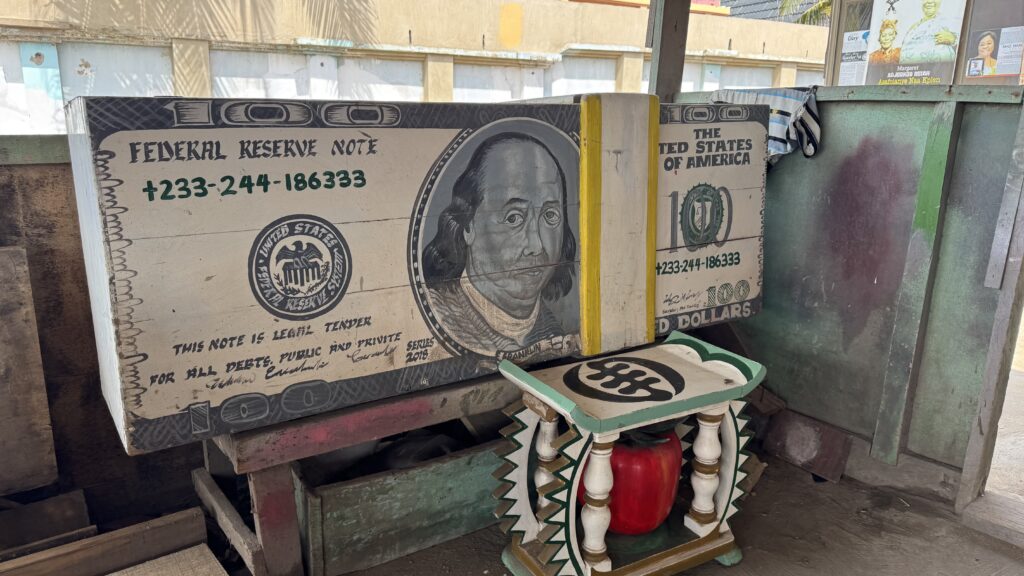
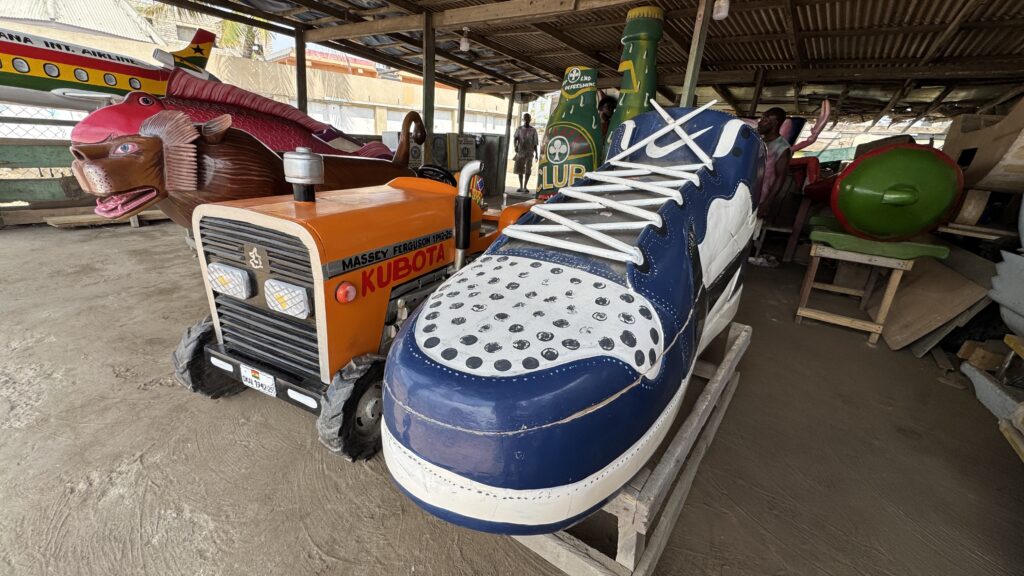
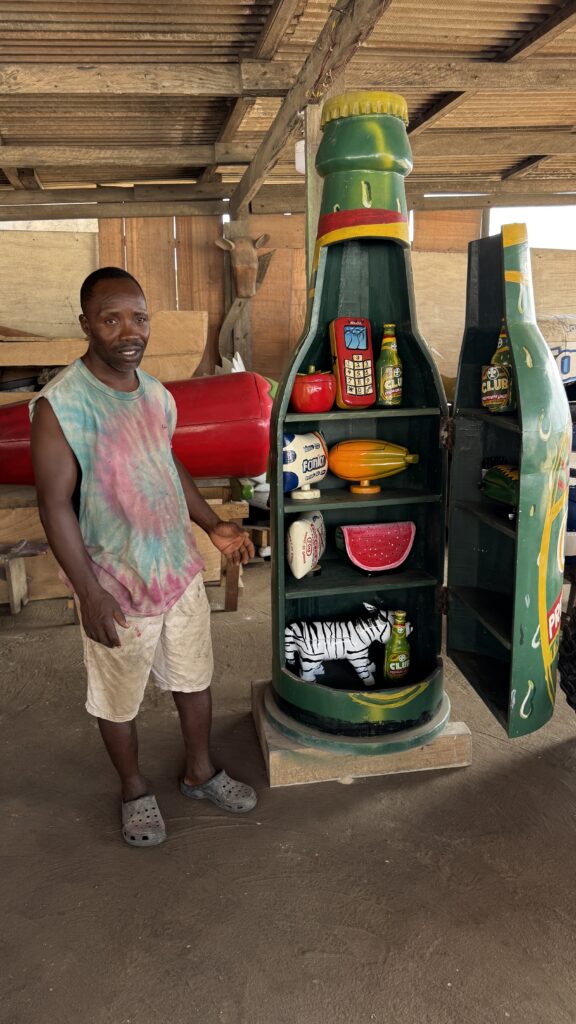
See Insta-Worthy Coffins
Visiting a Ghanian casket maker is one of the best ways to see how traditional carpentry blends with local art to represent the Ghanaian beliefs in afterlife. The artist – Erico, told us that people commission their own caskets while they are living to depict their professional, aspirations or something that they love. You can see bright and colorful caskets in shapes of airplanes, and even beer bottles!
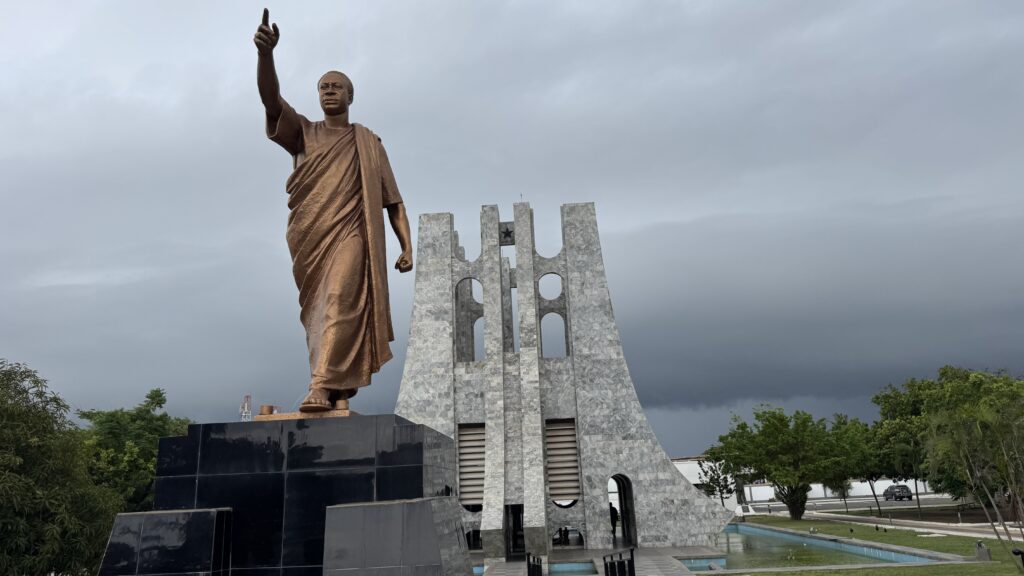
Cultural Highlights Around Accra
Make sure to check out some of the rich heritage of Old Accra and major attractions around the city.
- The National Museum of Ghana – It’s the best place in Accra to trace Ghana’s story from ancient Nok terracottas and Ashanti gold weights to post-independence art, all under one roof. You will see the cultural diversity of the country.
- Kwame Nkrumah Mausoleum – Mausoleum and museum honoring Ghana’s first president and the spirit of independence. It is interesting to learn about the legendary hero who helped create diplomacy between Ghana and many countries around the world.
- Osu Castle/ Fort Christiansborg – Its not really a castle, but a modest and unkept whitewashed fort that once housed the government of the Gold Coast under the Scandinavian rule. Visiting also helps piece the story about the slave trade. If you want to learn more about the “castles of Ghana” read the book ‘Homegoing’ by Yaa Gyasi.
- James Fort – Crumbling relics of Accra’s colonial past. Unfortunately, the buildings are not very well kept. But you can get a glimpse into the dark chapters of West African history and watch the nooks and crannies around one of the busiest slave trade routes. James Fort and Ussher Fort in Jamestown are UNESCO Heritage sites.
Dive Into Makola Market
With my guide, I explored Makola Market, the largest open-air market in Accra. On your own, the labyrinth of alleys can feel overwhelming — endless rows of spices, towers of dried fish, and fabric stalls tucked into corners. My guide introduced me to a textile seller who explained how to distinguish quality batik from cheaper imports. We ducked in and out of shaded stalls, learning that in Ghana, shopping is equal parts transaction and relationship.
It may feel chaotic to walk through such a chaotic market, but a local guide can be helpful in navigating around the streets and peddlers. The best time to visit is in the morning (8–10am, Tuesday–Saturday) when vendors are setting up and the heat is bearable.
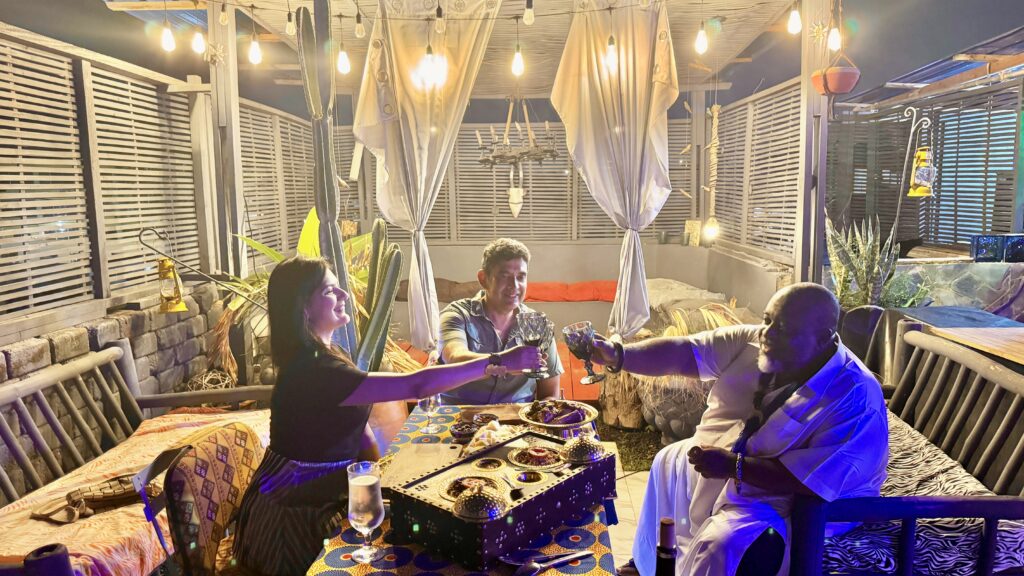
Private Culinary Experience with Chef PaJohn Bentsifi Dadson
One of the highlights of my trip to Accra was a private dinner experience with Chef PaJohn, a fixture in Ghana’s food scene. Chef PaJohn welcomed us to his home where we sat at the Bohemian decorated rooftop talking about the history of ingredients and dishes from West Africa to the southeast United States. He prepared many of the traditional dishes – such as smoked mackerel, waakye (rice and black eyes peas), garri fortor (grated cassava with fried plantain). Each of them were created with a modern twist and elegant plating. We ate several courses of delicious food, drank wine and chatted for hours.
Chef PaJohn “WangoWango” culinary philosophy and curated travel experience are offered through his Native Adventures. It celebrates is the joy of food, by combining immersive cultural experiences with meals sourced and prepared locally, blending storytelling, culinary craft, and sustainable tourism.
Day 2: Culture, Crafts, and Connection
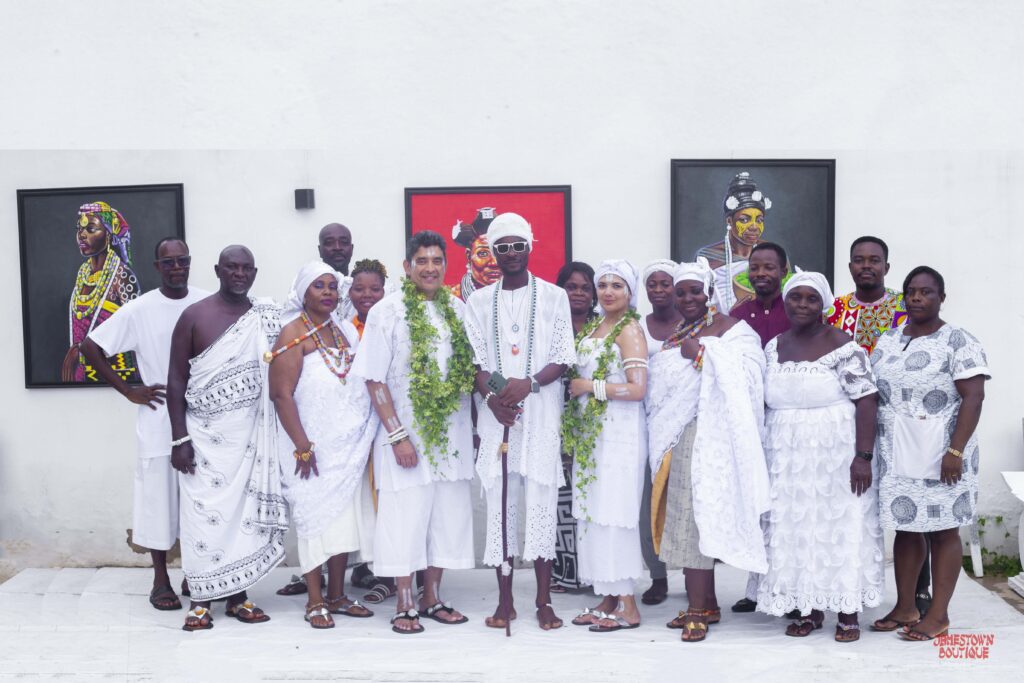
A Naming Ceremony I’ll Never Forget
The next morning, I was welcomed into a private home courtyard for a traditional Akan naming ceremony. Elders dressed me and my husband in all white clothing, with white beaded jewelry. Then the entire community, included priests and mayors came to bless us and welcome us to the family. They poured libations, drummers set a steady rhythm, and I was given the name Naa Aku – which means “She is rich through smart and hard work. Loved by many due to her eagerness and smiles at all times”. The priest had already consulted with the Gods about what our names should be, before even meeting us. We sat around the table enjoying snacks and having deep conversations about spirituality, culture and humanity. We felt more like a family member, than a tourist.
The ritual was both intimate and communal, a reminder that travel isn’t just about observing culture but participating in it with respect.
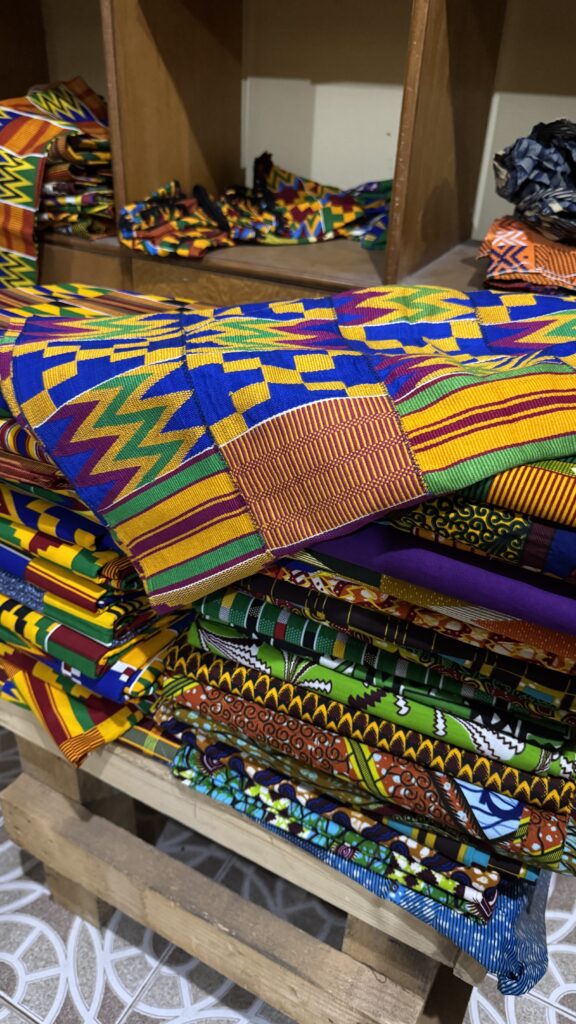
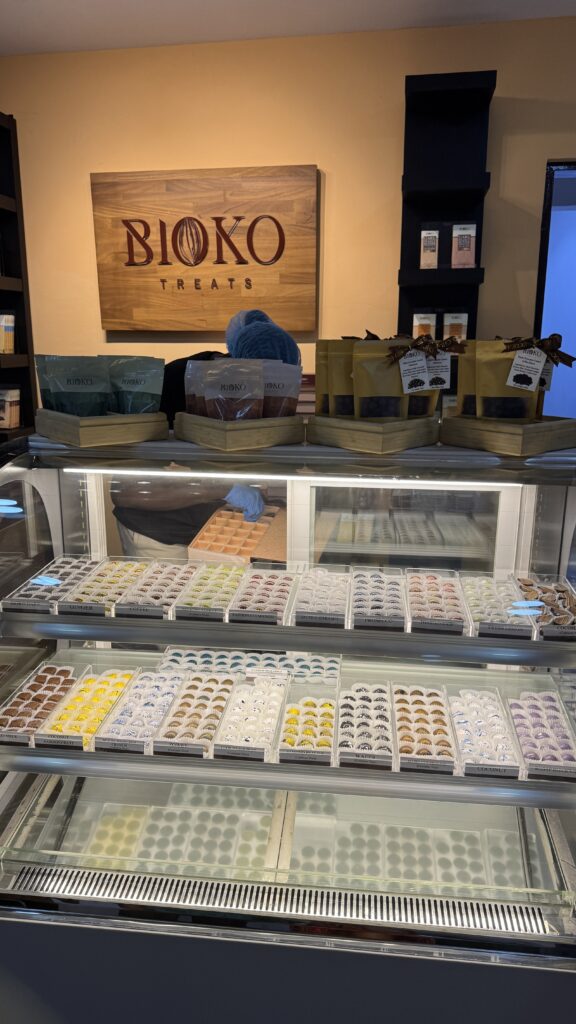
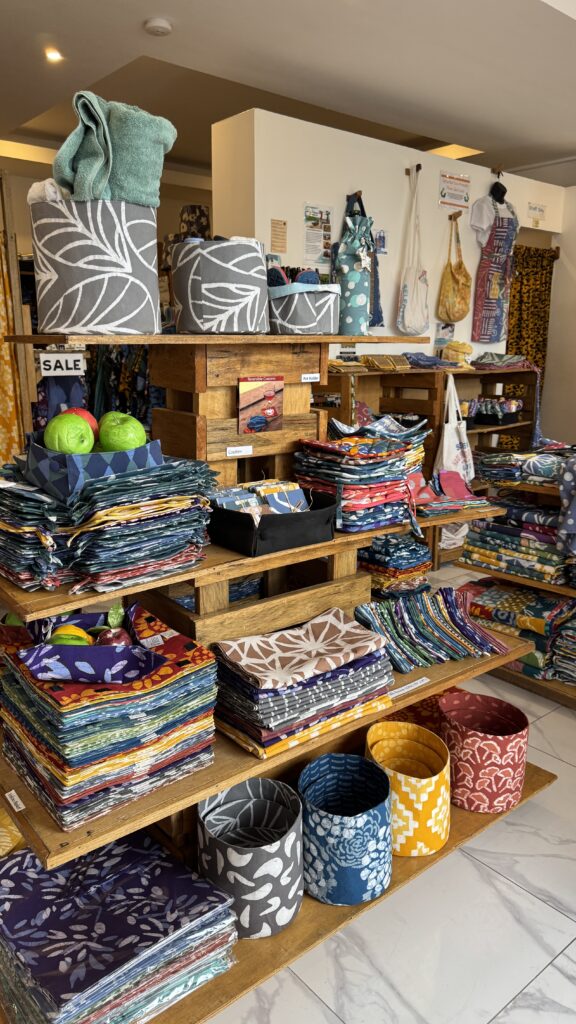
Shopping with Purpose
At Global Mamas, a fair-trade women’s cooperative, I watched artisans stamping wax into cloth and laying batik fabrics in the sun to dry. Each piece came labeled with the woman who made it. Shopping here wasn’t about souvenirs — it was about livelihoods.
At the Arts Centre, bargaining was playful and respectful, with each negotiation ending in smiles. Its a good place to buy local art, fabrics, and wood carvings.
Sample bean-to-bar chocolates and truffles at Bioko. Make sure to take some chocolate covered cashews and hazelnuts back home for gifts.
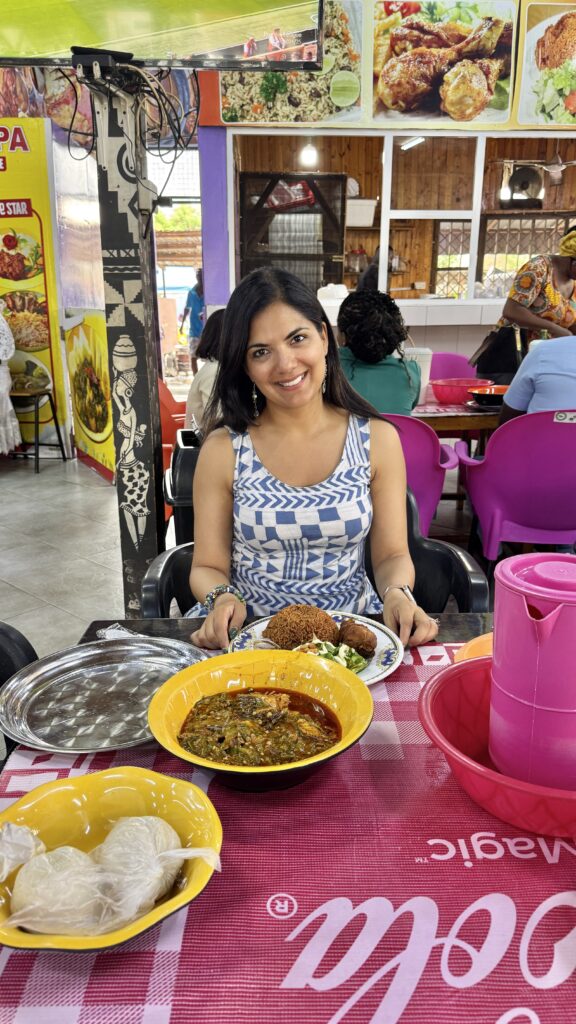
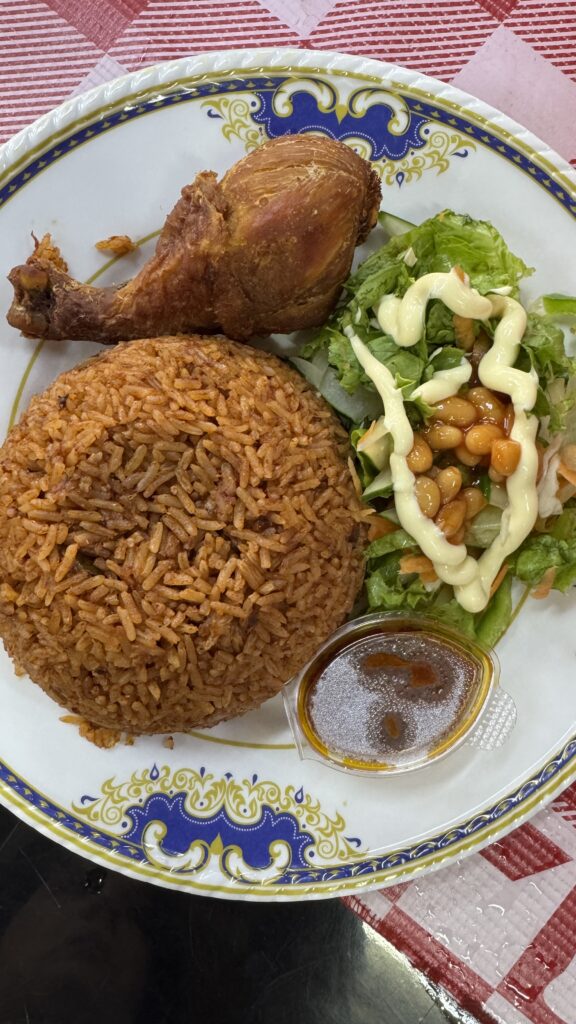
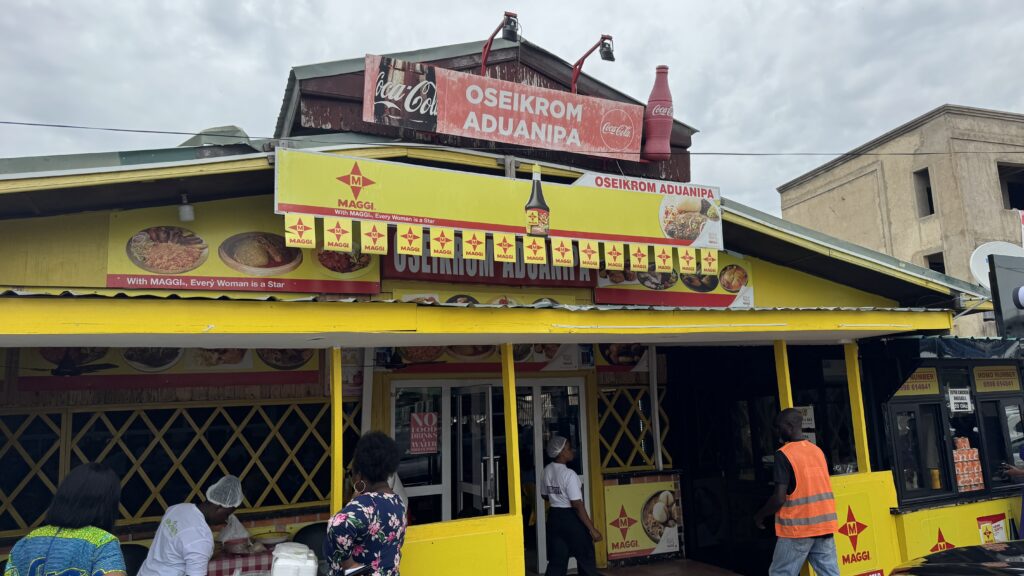
Eating Accra: Where to Savor the Local Flavors
There is a wide range of restaurants in Accra serving everything from fine French cuisine to food trucks, pastry shops to street foods. If you dare to dive into the local cuisine, go to one of the restaurants where they serve huge portions of soups, stews, and fufu at very low prices. You will find yourself at a shared table, washing your hands in buckets right at your seat, eating with your hands, and listening to upbeat Ghanian music.
Note that dining in Accra is not cheap, as the taxes can really add up. With VAT, service charge and Ghana tourism levy, you will often pay 33% more on top of your bill.
- Buka Restaurant (Osu): Smoky jollof rice and goat skewers served in a lively courtyard.
- Chez Clarisse: Char-grilled tilapia dusted with chili, served with cassava attiéké.
- Street Eats: Kelewele — spiced plantains fried on the roadside — were fiery, caramelized, and unforgettable.
- For local coffee in a fun ambiance, go to one of the Jamestown Coffee Co locations.
Why I Traveled with Kensington Tours
Accra is exhilarating, but traveling in West Africa can also be daunting. Streets are packed, schedules are fluid, and experiences like a naming ceremony or private cooking session aren’t accessible without introductions. Traveling with Kensington Tours meant every door opened — responsibly and authentically — through locals who wanted to share their stories. It gave me access without intrusion, and the confidence that my trip supported Ghanaian communities directly.
In 48 hours, I experienced more than sightseeing. I connected with people, traditions, and flavors that made me reflect on how travel can be sustainable and soulful. Accra showed me that responsible travel isn’t about doing less — it’s about doing better. Supporting cooperatives, choosing local experiences, and embracing cultural rituals left me with stories and friendships, not just photos.